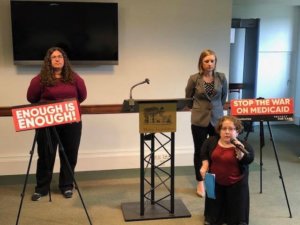Washington, D.C. – The conservative Washington Examiner reports that repeal of the Affordable Care Act “may be closer than you think.” In response, Protect Our Care Campaign Director Brad Woodhouse released the following statement:
“If it’s a day that ends in Y, Republicans are scheming to take away our health care. Today’s report confirms that Mike Pence and Mitch McConnell will stop at nothing to take us back to the days when insurance companies called the shots. The bill they seek to revive would force millions off coverage, make health care even more expensive, get rid of protections for people with pre-existing conditions, re-implement lifetime coverage caps, and slash Medicaid. Enough is enough – it’s time for the GOP to end its war on our health care.”
Obamacare repeal may be closer than you think
Washington Examiner // Quin Hillyer // April 26, 2018
Time and opportunity still exist to replace Obamacare.
Senate Majority Leader Mitch McConnell, R-Ky., ought to make it a priority, and should make clear he is open to pushing through a budget resolution next month to make it happen.
It can’t happen without the budget resolution, because that’s the only way they can avoid a bill-killing filibuster and pass the healthcare reform with a bare majority of 50 votes (plus Vice President Mike Pence) in the Senate.
I reported in January that a number of conservative groups, under the leadership of former Sen. Rick Santorum, was working hard to craft a new Obamacare replacement that could both pass Congress and work well in the real world. Behind the scenes, those groups (indeed, representatives from a growing number of groups) have continued to meet and tweak their plan, and they seem just a few weeks away from being able to unveil it.
When they unveil it, expect a host of such groups to make a concerted effort to rally grassroots support and give courage to House and Senate members to pass it. This is an amazing, even unprecedented project, truly growing up from activists and thinkers rather than being the usual top-down, elected-official-led exercise in sausage-making.
I listened in on a March 21 conference call among numerous interested parties, and received further updates within the past week from Santorum.
The White House has been quietly but constructively supportive of the project, I am told, and should provide strategic and communications support this time that is well planned, rather than the more seat-of-the-pants effort we all saw last year. Pence, in particular, has been personally engaged.
Politically, the now-defunct assessment had been that passing a health-policy overhaul would scare too much of the public in an election year, making it a nonstarter. The growing understanding, though, is that Republicans are already at risk of losing to a “blue wave” this fall anyway, and that bold action to energize conservative grassroots might be the only way to stop the wave.
The Left is going to be energized this fall regardless of what Congress does, and those parts of professional suburbia that just won’t vote for Republicans under Trump also aren’t going to become even more anti-GOP than they already are. Indeed, as this is exactly the demographic that suffers the most under Obamacare, it might be slightly less likely, not more, to oppose the GOP if Republicans do actually pass reform.
But giving conservative voters a “win” on Obamacare would surely drive up Republican turnout.
Substantively, the bill design has evolved since January. It still uses the basic template of last year’s Graham-Cassidy bill, but only in the sense that it would remain a system of block grants to the states. As in January, it still envisions a significant expansion of health savings accounts — indeed, from January’s thought of doubling the existing number of HSAs, the new plan now may quadruple them — and also a guarantee that individuals served by state-government-run plans can opt-out and use the money in private markets instead.
A key development, however, has emerged since January. It should help garner the votes of previously recalcitrant Senate Republicans. Under the original Graham-Cassidy bill, the formula for the block grants was seen by some as disfavoring states that already expanded Medicaid coverage under Obamacare. The new formula phases in the grants in a way that ensures those particular states will not see what amounts to short-term cuts in federal funding.
This might make the new plan slightly more expensive in the short run, but still well within budgetary parameters, and still better than deficit-neutral. Moreover, the bill’s designers keep tweaking it to produce better risk-mitigation concepts and other ways to keep premiums lower.
Politically, the effort got a huge boost when Democrats (ironically) killed efforts to include an Obamacare insurance bailout within the recent budget agreement and spending bills. With that effort dead, key players such as Sen. Lamar Alexander, R-Tenn., have indicated renewed willingness to go for a “big fix” because their smaller efforts to patch existing law are now dead.
In the end, this is not just about budgetary bean-counting or an attempt to gain political bragging rights. This is about better serving patients, giving them more options and making healthcare more affordable.
Organizers hope Americans sick of the broken Obamacare system will start calling their members of Congress now, urging them to try again. It’s a worthy undertaking.

